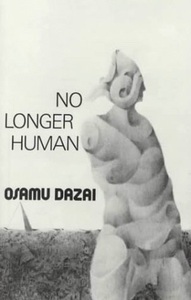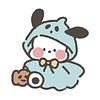Take a photo of a barcode or cover
Deze semi-autobiografische roman uit 1948 en onlangs in vertaling uitgebracht, gaat over iemand die niet in staat is om onderdeel van de samenleving te zijn en hoe hij daarmee omgaat. Hij meet zich een rol als clown aan en later zoekt hij zijn heil in alcohol en pillen. Bijzonder meeslepend verhaal door de stijl, de structuur en de fascinerende, zelfdestructieve hoofpersoon.
Ik had nog nooit van deze schrijver gehoord, maar dit is wel een van de grote verrassingen van dit jaar!
Volledige bespreking via deze link: https://bit.ly/3Gu4b1M
Ik had nog nooit van deze schrijver gehoord, maar dit is wel een van de grote verrassingen van dit jaar!
Volledige bespreking via deze link: https://bit.ly/3Gu4b1M
dark
reflective
sad
medium-paced
I'm so glad that this wasn't my first Osamu Dazai book, despite it being on my TBR the longest, because I'm not sure I would've tried out his other work if this had been my first experience. The first two I read, The Flowers of Buffoonery and Self-Portraits, were also semi-autobiographical, but I enjoyed them much more. The Flowers of Buffoonery has the same protagonist as No Longer Human, but ten years before, and maybe the narrower subject matter and timeline made it more enjoyable. Self-Portraits is an autobiographical short story collection, which I hadn't ever tried before, and it had a distinct narrative voice that made both the depressing and mundane aspects of life easier to stomach.
I did also enjoy the writing of No Longer Human, but I couldn't find it in me to consistently care about the characters or themes. It felt a bit like watching a man hurt the people around him, especially women, over and over again without significant change. This idea that the protagonist doesn't understand society, and that society doesn't understand him, is a fine enough theme when done well. Sayaka Murata is the first author that comes to mind. Our protagonist here, however, seems to think of himself as an exceptional case, whereas Sayaka Murata's characters seek connection, at least in my opinion. I don't think it's enjoyable to read a man say that society doesn't understand him while hurting people!
I think I enjoyed the beginning of the book the most. Reading about a child who hides his complex feelings by acting silly so that other people like him is interesting! That youthful confusion and struggle felt so much more real than woman after woman being strangely drawn to a depressed man who mistreats them. Other people clearly get more out of this book than I do, but I don't quite know how. The explorations of selfhood and human nature just didn't do much for me.
I did also enjoy the writing of No Longer Human, but I couldn't find it in me to consistently care about the characters or themes. It felt a bit like watching a man hurt the people around him, especially women, over and over again without significant change. This idea that the protagonist doesn't understand society, and that society doesn't understand him, is a fine enough theme when done well. Sayaka Murata is the first author that comes to mind. Our protagonist here, however, seems to think of himself as an exceptional case, whereas Sayaka Murata's characters seek connection, at least in my opinion. I don't think it's enjoyable to read a man say that society doesn't understand him while hurting people!
I think I enjoyed the beginning of the book the most. Reading about a child who hides his complex feelings by acting silly so that other people like him is interesting! That youthful confusion and struggle felt so much more real than woman after woman being strangely drawn to a depressed man who mistreats them. Other people clearly get more out of this book than I do, but I don't quite know how. The explorations of selfhood and human nature just didn't do much for me.
dark
mysterious
sad
tense
fast-paced
Plot or Character Driven:
Character
Strong character development:
Complicated
Loveable characters:
Complicated
Diverse cast of characters:
No
Flaws of characters a main focus:
Yes
dark
emotional
reflective
slow-paced
Plot or Character Driven:
Character
Strong character development:
Complicated
Loveable characters:
Complicated
Diverse cast of characters:
Yes
Flaws of characters a main focus:
Yes
1st read: 4/5
looking back at this i don’t understand why i loved it so much when it wasn’t even as good as i thought it was. deducting one star
looking back at this i don’t understand why i loved it so much when it wasn’t even as good as i thought it was. deducting one star
dark
emotional
reflective
sad
slow-paced
Plot or Character Driven:
Character
Strong character development:
No
Loveable characters:
No
Diverse cast of characters:
No
Flaws of characters a main focus:
Yes
“All I feel are the assaults of apprehension and terror at the thought that I am the only one who is entirely unlike the rest. It is almost impossible for me to converse with other people.”
Everything passes.
Everything passes.
Graphic: Suicidal thoughts, Suicide, Suicide attempt
Moderate: Rape
This book is a highly introspective view into how mental health shapes how people view themselves and others. This is told through the lens of a man named Yozo, where the reader follows his unhappy life from childhood to adulthood. Being a part of a big family and having an inability to truly connect with his parents at a young age inhibits his earliest form of socialization. These effects snowball as he begins attending school, where he begins “clowning” as an effort to build relationships with others. In reality it is just interaction, not connection. Some of his mental health struggles are caused by his upbringing, and others are unique to him, such as fleeing from relationships when they begin getting too deep. In living a life that is meaningless, Yozo turns to substances to escape his lack of fitting in. He feels like someone who cannot accept love and condemns himself, but he wants deeply to experience authentic joy. The emotionless structure of the book depicts Yozo’s internal monologue with little development of other characters, which is fitting because he struggles to empathize with others or understand their thoughts. Additionally, he lives during a time when mental health is not widely discussed. Just as he was forgotten about as a child, his condition becomes overlooked and even dismissed into adulthood. As Dazai uses No Longer Human to confront the darkest parts of the human psyche, many readers will relate to the feelings of being socially deviant some way and struggling to figure out who we really are. For both Yozo and ourselves, the question becomes how we respond and find true belonging in the world when we feel like we’re on the outside.
dark
emotional
sad
dark
emotional
reflective
sad
medium-paced
Plot or Character Driven:
Character
Strong character development:
Complicated
Loveable characters:
No
Diverse cast of characters:
No
Flaws of characters a main focus:
Yes
challenging
dark
reflective
medium-paced
Plot or Character Driven:
Character
Strong character development:
Yes
Loveable characters:
No
Diverse cast of characters:
No
Flaws of characters a main focus:
Yes






